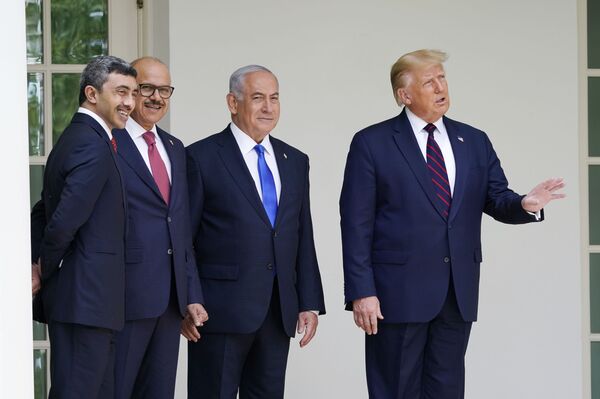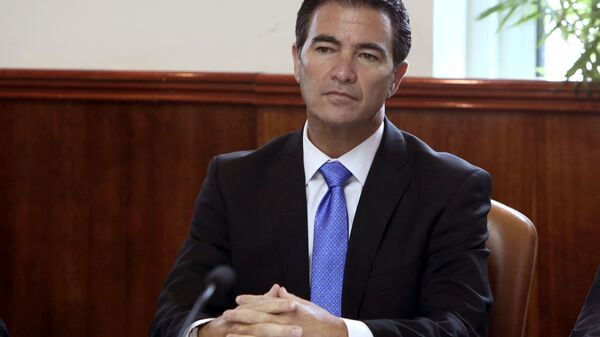Saudi Arabia may join its Persian Gulf neighbours in normalising relations with Tel Aviv, Mossad spy agency chief Yossi Cohen has indicated.
Speaking to Israel’s Channel 12 in an interview which aired Wednesday, Cohen hinted that he believes a normalisation between Tel Aviv and Riyadh “could happen.” Asked whether he had secretly met with Crown Prince Mohammed bin Salman, as he had with other leaders, the spymaster smiled, and said he’d “like not to comment on that point”.
Commenting on the US-facilitated Abraham Accords between Israel, the United Arab Emirates and Bahrain, which were signed in a formal ceremony in Washington on Tuesday, Cohen described them as “the breaking of a glass ceiling that existed in our relations with Arab states”.
The UAE and Bahrain became just the third and fourth Arab states, and the first and second Arab countries in the Persian Gulf region, to sign a peace deal with Israel since the country’s creation in 1948. Before that, Egypt signed a US-facilitated peace deal with Tel Aviv in 1979, and Jordan signed a peace treaty with the Israelis in 1994.
Cohen hinted at his agency’s role in the clandestine negotiations which preceded the normalisation of ties with Abu Dhabi and Manama, saying the signing of a peace deal followed many years of “contacts managed very, very delicately”.
The spy chief also pointed to the role of the Arab sheikdoms’ animosity toward Iran in improving the prospects of establishing ties with Israel. “You must build a system of mutual trust between us and them…Trust, that we are here for them and they are here for us, together against all these threats,” he said.
Commenting on the UAE and Bahrain’s decision to improve relations with Israel despite the wishes of Palestinians, who described their actions as a “betrayal” akin to being “stabbed in the back”, Cohen said he felt “that both Bahrain and Abu Dhabi, the UAE in general, chose their longer-term interests”.

Globetrotting Spymaster
Cohen secretly spoke to Bahraini Prime Minister Khalifa bin Salman Al Khalifa in the weeks prior to the country’s announcement that it would be joining the UAE in normalising relations with Tel Aviv. Before that, Israeli media reported that he personally facilitated and took part in a clandestine visit by Israeli Prime Minister Benjamin Netanyahu to the UAE in 2018 to help that country get onboard with the idea of a peace deal.
Earlier this year, Cohen reportedly flew to Egypt and Qatar, again in secret, and made contact with Saudi Arabia and other Gulf States, to discuss Israeli plans to ‘apply sovereignty’ to large chunks of Palestinian territory in the West Bank. That move has been at least temporarily shelved since the signing of the Abraham Accords, although Netanyahu has indicated that the postponement would not be permanent.
On Tuesday, President Trump said he expected Riyadh to follow Abu Dhabi, Manama and several other unnamed countries in normalising relations with Israel in the near future. “We have many other countries going to be joining us, and they’re going to be joining us soon,” Trump said, speaking to reporters after the UAE and Bahrain formally normalised ties with Israel. “We’ll have 7 or 8 or 9. We’re going to have a lot of other countries joining us, including the big ones,” he said, adding that he had spoken with the king of Saudi Arabia about the issue.

Last week, Saudi Foreign Minister Adel al-Jubeir indicated that Riyadh envisions the establishment of a Palestinian state within the borders of 1967, with East Jerusalem as its capital, “in accordance with international legitimacy and the Arab Peace Initiative” of 2002.
18 of the Arab League’s 22 members, including Algeria, Comoros, Djibouti, Iraq, Kuwait, Lebanon, Libya, Mauritania, Morocco, Oman, Palestine, Qatar, Saudi Arabia, Somalia, Sudan, Syria, Tunisia, and Yemen, continue to have no formal relations with Israel.


